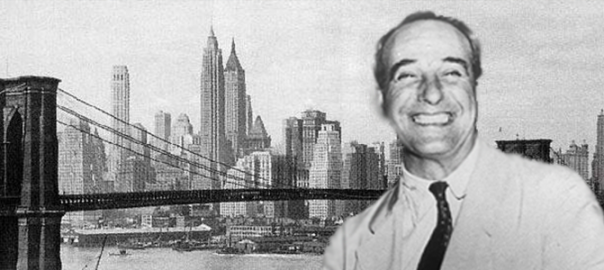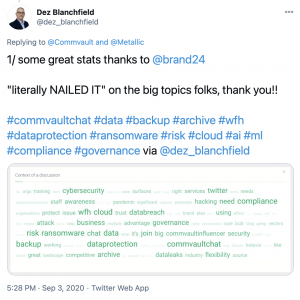
Robert Moses may be the most influential historical figure you’ve never heard of.
Moses was the master builder of New York. If you’ve ever set foot in a major city, he’s affected your life.
He built more infrastructure than any individual in modern history. To name a few of his works, he built Shea Stadium, Lincoln Center, Jones Beach, the United Nations headquarters in New York, the Henry Hudson Parkway, the Verrazano Narrows Bridge and the Triborough Bridge.
He also had more public works named after him in his lifetime than any other non-president in American history: Two state parks, Robert Moses State Park (Thousand Islands) and Robert Moses State Park (Long Island); the Robert Moses Causeway on Long Island; the Robert Moses State Parkway in Niagara Falls, New York; and the Robert Moses Hydro-Electric Dam.
By the time he left office, he had built 658 playgrounds in New York City alone, plus 416 miles (669 km) of parkways and 13 bridges.https://www.marketingsherpa.com/article/case-study/obama-email-campaign-testing>. ‘ href=”https://taylorpearson.me/power/#easy-footnote-bottom-2″ target=_blank>2
What Does It Take To Get Things Done?
The interpretation of Moses’ legacy is mixed.
At the time The Power Broker came out in the 1970s, everyone agreed with Caro’s impression that Moses was “a mean son of a bitch” and responsible for the Fall of New York.
He was overtly classist and racist, building bridges unnecessarily low over his parkways to prevent buses, and the less wealthy people who rode them, from using his parkways.
At some points, Moses comes across as an alpha gorilla, taunting his superiority in another gorillas face, just to show he can.
He is responsible for the abysmal state of public transportation in New York. For forty years he blocked every public transportation project, preferring instead the grand parkways and bridges that would serve as monuments to his legacy.
He got away with it because he never took a meaningful salary and never skimmed off of public funds. This made him untouchable legally, and politically helped him maintain the image of a selfless public servant. His currency of choice was power, not money.
Recently, there has been a re-interpretation of Moses.
Moses built many of the parks and green spaces which make the city that is often referred to as “a concrete jungle” livable. The Hamilton Fish Pool and The Lincoln Center, of the Lower East Side and the Upper West Side respectively, both became anchors that helped rejuvenate decaying neighborhoods.
Anytime you are doing major construction in an already densely populated area, there is going to be someone who is unhappy with it, even if it’s a net benefit to the city and the people who live there.
How do we decide when it’s appropriate and when it’s not?
Can we construct a way to get things done that doesn’t require actors like Moses?
Eaten Alive by Power
When Moses was finally removed from power in his 70s, he was unable to step down into life as a private citizen.
Desperate to regain power, he spent years sending out memos and calling old allies trying to get some of his influence back.
In his mid-80s he was having lunch with the Bronx Borough President, and the president called him “Bob” instead of his preferred “Mr Moses.”
His head jerked back. Ten years earlier such familiarity from a man he considered his subordinate would have been met with an icy glare that had withered mayors and their aides for decades.
However, remembering he desperately needed any friends he could get, his head bowed back down and he continued the conversation.
I was reminded of a section of David Foster Wallace’s famous commencement speech, This is Water:
“Because here’s something else that’s weird but true: in the day-to day trenches of adult life, there is actually no such thing as atheism. There is no such thing as not worshipping. Everybody worships. The only choice we get is what to worship. And the compelling reason for maybe choosing some sort of god or spiritual-type thing to worship — be it JC or Allah, be it YHWH or the Wiccan Mother Goddess, or the Four Noble Truths, or some inviolable set of ethical principles — is that pretty much anything else you worship will eat you alive.
If you worship money and things, if they are where you tap real meaning in life, then you will never have enough, never feel you have enough. It’s the truth. Worship your body and beauty and sexual allure and you will always feel ugly. And when time and age start showing, you will die a million deaths before they finally grieve you. On one level, we all know this stuff already. It’s been codified as myths, proverbs, clichés, epigrams, parables; the skeleton of every great story. The whole trick is keeping the truth up front in daily consciousness.
Worship power, you will end up feeling weak and afraid, and you will need ever more power over others to numb you to your own fear. Worship your intellect, being seen as smart, you will end up feeling stupid, a fraud, always on the verge of being found out. But the insidious thing about these forms of worship is not that they’re evil or sinful, it’s that they’re unconscious. They are default settings.
They’re the kind of worship you just gradually slip into, day after day, getting more and more selective about what you see and how you measure value without ever being fully aware that that’s what you’re doing. And the so-called real world will not discourage you from operating on your default settings, because the so-called real world of men and money and power hums merrily along in a pool of fear and anger and frustration and craving and worship of self.
Our own present culture has harnessed these forces in ways that have yielded extraordinary wealth and comfort and personal freedom. The freedom all to be lords of our tiny skull-sized kingdoms, alone at the center of all creation.
This kind of freedom has much to recommend it. But of course there are all different kinds of freedom, and the kind that is most precious you will not hear much talk about much in the great outside world of wanting and achieving and [unintelligible — sounds like “displayal”]. The really important kind of freedom involves attention and awareness and discipline, and being able truly to care about other people and to sacrifice for them over and over in myriad petty, unsexy ways, every day.”
In the end, his lust for power ate Robert Moses alive.
Acknowledgments: Shane Parrish, Ryan Holiday, and Drew Austin.
Business & Finance Articles on Business 2 Community(119)
Report Post









